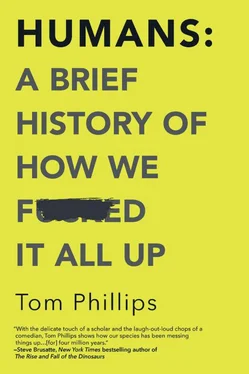Tom Phillips - Humans - A Brief History of How We F*cked It All Up
Здесь есть возможность читать онлайн «Tom Phillips - Humans - A Brief History of How We F*cked It All Up» весь текст электронной книги совершенно бесплатно (целиком полную версию без сокращений). В некоторых случаях можно слушать аудио, скачать через торрент в формате fb2 и присутствует краткое содержание. Город: Toronto, Год выпуска: 2019, ISBN: 2019, Издательство: Hanover Square Press, Жанр: История, Юмористические книги, на английском языке. Описание произведения, (предисловие) а так же отзывы посетителей доступны на портале библиотеки ЛибКат.
- Название:Humans: A Brief History of How We F*cked It All Up
- Автор:
- Издательство:Hanover Square Press
- Жанр:
- Год:2019
- Город:Toronto
- ISBN:978-1-48805-113-5
- Рейтинг книги:4 / 5. Голосов: 1
-
Избранное:Добавить в избранное
- Отзывы:
-
Ваша оценка:
- 80
- 1
- 2
- 3
- 4
- 5
Humans: A Brief History of How We F*cked It All Up: краткое содержание, описание и аннотация
Предлагаем к чтению аннотацию, описание, краткое содержание или предисловие (зависит от того, что написал сам автор книги «Humans: A Brief History of How We F*cked It All Up»). Если вы не нашли необходимую информацию о книге — напишите в комментариях, мы постараемся отыскать её.
Humans: A Brief History of How We F*cked It All Up — читать онлайн бесплатно полную книгу (весь текст) целиком
Ниже представлен текст книги, разбитый по страницам. Система сохранения места последней прочитанной страницы, позволяет с удобством читать онлайн бесплатно книгу «Humans: A Brief History of How We F*cked It All Up», без необходимости каждый раз заново искать на чём Вы остановились. Поставьте закладку, и сможете в любой момент перейти на страницу, на которой закончили чтение.
Интервал:
Закладка:
Possibly nobody could have stopped the Spanish invasion, but Moctezuma’s decision to welcome them as guests has to go down as one of the most ill-advised pieces of international relations policy in history. And to be honest, if the Mexican government had pondered his example 300 years later when they started encouraging American immigration into Texas, then the key lesson of Moctezuma’s sorry tale—“for God’s sake, Mexico, stop inviting white people into places”—might have led to history playing out very differently.
Fortunately for Moctezuma’s reputation, he’s not alone in history’s hit parade of poor international relations choices.
The crucial nature of choosing your friends wisely can be seen in the story of the Roman governor of Germany in 9 CE, Publius Quinctilius Varus. Varus was trying to do the classic occupying-force thing: picking and choosing local nobles to be on your side, in order to keep the peasants relatively placid. Unfortunately for him, he chose to put his trust in a Germanic tribal leader named Arminius, on the grounds that he had been made a Roman citizen and even led an auxiliary unit in the Roman army. Despite being warned that his trusted adviser might not be quite on the straight and narrow, he chose to believe Arminius when he told him there was an uprising among German tribes that needed to be put down. Arminius steered Varus and his Roman legions right into an ambush—one which he himself led, after pulling the old “I’m just going to ride ahead to check things out” trick. Three whole Roman legions were wiped out (the worst military defeat in their history) and the Roman Empire’s northward expansion was stopped in its tracks.
On the flip side to being overly trusting, there’s the self-defeating Chinese foreign policy under the Ming Dynasty, which has become a case study in the perils of isolationism. In the first three decades of the 1400s, China had one of the greatest naval fleets in the history of the world, under the command of the legendary mariner Zheng He. Composed of up to 300 ships, including enormous nine-masted vessels larger than any boat that would sail for centuries in the future, the fleet carried as many as 30,000 men; it even included ships that acted like floating farms, growing vegetables and keeping herds of animals.
What’s more, during this period the Chinese were notable for not really using their fleet to do much in the way of, you know, invading places. Certainly they spent quite a lot of time fighting pirates, and the fleet was very handy for vaguely threatening displays against any country considering stepping out of line—but in all of Zheng He’s seven voyages to destinations across Asia, Arabia and Eastern Africa, it was only involved in one relatively minor war. Instead, it spent most of its time visiting ports as far-flung as Malacca, Muscat and Mogadishu, and… well, exchanging presents. The Chinese gave out precious metals and fine cloths, and would get a wide variety of gifts back, including an awful lot of animals. One time they brought a giraffe back from Kenya.
As displays of overwhelming force by imperial powers go, it all sounds rather nice compared to the alternatives. And so it’s particularly baffling that after Zheng He’s death in 1433, the Ming Dynasty just sort of… stopped. They abandoned their navy. In a pretty extreme overreaction to the continued operation of Japanese pirates, they resurrected the old policy of haijin —an almost complete ban on any maritime shipping. Distracted by ongoing battles with the Mongols in the north, foreign diplomatic missions were seen as an unnecessary expense, the money better spent on a different project: the construction of a very large border wall.
In the following years, China turned increasingly inward, shutting out the world. The fact that they did this just at the point when European navies were starting to explore the globe had a double effect: it meant that when the Europeans started to show up in Asian waters a few decades later, there wasn’t a major local power to stand in their way, and it meant that China kind of missed out on much of the scientific and technological acceleration that was kicking off. It would be a long, long time before the country regained its status as a world power.
That highlights just how much diplomatic choices are, to an extent, about trying to predict how power balances will shift in the future. Given that this is impossible to do with anything close to accuracy, it’s not entirely surprising that people get it wrong so often. In Switzerland during the late spring of 1917, right in the midst of World War I, a middle-aged man with a funny beard had a proposal for the German government. He was Russian, and he desperately wanted to get back home to his own country, which was in the grip of political upheaval, but the war made traveling across Europe all but impossible. The best route back to Russia was to head northward through Germany, but the man would need German permission to do that. And the German government were no fans of his politics.
The pitch was simple. For all their differences, he and the Germans currently had a shared enemy: the Russian government, who he didn’t like and was rather keen to overthrow. The German High Command were fighting a war on several fronts, and reasoned that any distraction that might divert Russian resources away from the front lines would be helpful. So they agreed. They put the man, his wife and 30 more of his compatriots on a train to a northern port, from where they’d travel onward via Sweden and Finland. It wasn’t much of a vanguard, but it was better than nothing. The German authorities even gave them some money, and would continue to help them out financially over the following months. They probably imagined that like most political obsessives with a niche cause, the man would stir up a bit of trouble, get the Russians off their backs for a while and then fade quietly into obscurity.
Anyway, yeah, that guy was Lenin.
Now in many ways, the German plan worked flawlessly. Better than expected, in fact! The Bolsheviks didn’t just irritate and distract the Russian authorities, they absolutely wiped the floor with them. In just over six months, Russia’s provisional government was gone, Lenin was in power and the Soviet state was established. The Germans got a ceasefire that they couldn’t even have dared to dream about back in April when they’d waved Lenin’s train off.
In the slightly longer term, however, the plan was not what you’d call a runaway success.
For starters, the ceasefire on the Eastern Front didn’t actually help win the Germans the war. And subsequently, the relationship between the expansionist new Soviet state and their helpful German pals rapidly turned sour. Fast-forward a couple of decades and another world war later, and half of a newly divided Germany would be under Soviet control.

The Germans had fallen into the old trap of believing that their enemy’s enemy would be their friend. Which isn’t always wrong, exactly—it’s just that the friendship usually has a remarkably short shelf life. And that enemy’s enemy delusion lurks somewhere in the background of an astonishing number of history’s worst decisions, in addition to explaining several centuries’ worth of extremely confusing European history.
Another name for this phenomenon could be “postwar US foreign policy.” During the extended period of worldwide poor decision-making that was the Cold War, the US allied themselves with just about anybody who met the exacting criteria of “not being a communist.” Many of these allies were simply flat-out bastards (see: sundry dictators in Latin America, the succession of awful rulers in Vietnam). But on top of that core problem comes another one: these allies frequently had a habit of turning out to never have been huge fans of the US in the first place.
Читать дальшеИнтервал:
Закладка:
Похожие книги на «Humans: A Brief History of How We F*cked It All Up»
Представляем Вашему вниманию похожие книги на «Humans: A Brief History of How We F*cked It All Up» списком для выбора. Мы отобрали схожую по названию и смыслу литературу в надежде предоставить читателям больше вариантов отыскать новые, интересные, ещё непрочитанные произведения.
Обсуждение, отзывы о книге «Humans: A Brief History of How We F*cked It All Up» и просто собственные мнения читателей. Оставьте ваши комментарии, напишите, что Вы думаете о произведении, его смысле или главных героях. Укажите что конкретно понравилось, а что нет, и почему Вы так считаете.












